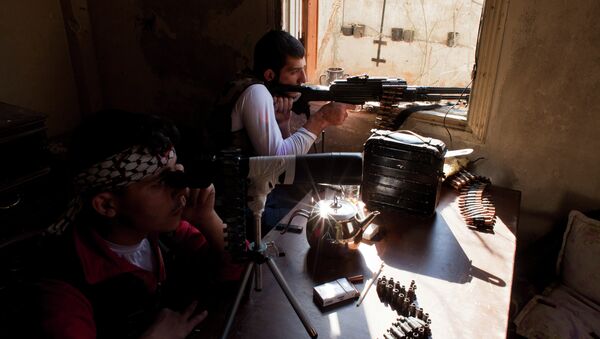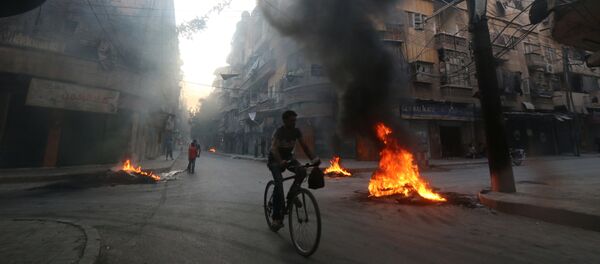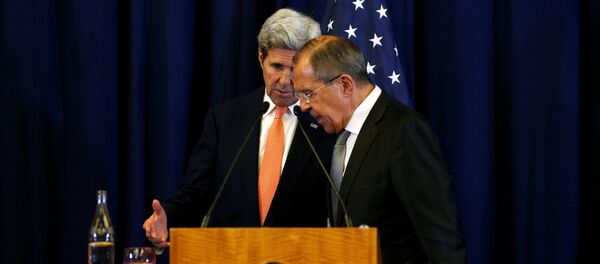History is being repeated: the Libyan "regime change" scenario has been taking shape in Syria for the last five years, according to James W. Carden, the executive editor for the American Committee for East-West Accord's EastWestAccord.com.
"It would be fair to view the debacle in Libya as a dress rehearsal for the war outside powers have been waging against the sovereign government of Syria for the past five years," Carden points out in his recent article for Consortiumnews.com.
The American scholar draws attention to a report entitled "Libya: Examination of intervention and collapse and the UK's future policy options" which was published by the UK Parliament's Foreign Affairs Committee on September 13.
"In March 2011, the United Kingdom and France, with the support of the United States, led the international community to support an intervention in Libya to protect civilians from attacks by forces loyal to Muammar Gaddafi. This policy was not informed by accurate intelligence. In particular, the Government failed to identify that the threat to civilians was overstated and that the rebels included a significant Islamist element," the report reads.
Commenting on the report, Carden recalls that the 2011 NATO intervention in Libya was founded on an ungrounded belief that then Libya's leader Muammar Gaddafi was "on the verge of committing a wholesale slaughter of the rebel stronghold Benghazi." This lie was propagated by both Western and Persian Gulf States' media outlets, the US scholar remarks.
Much in the same vein the UK-based Syrian Observatory for Human Rights (SOHR), the Gulf States-funded Syrian National Council and the Washington-based Syrian Expatriates Organization (SEO) have been sounding the alarm about the "atrocities" committed by Damascus against the Syrian people since the beginning of the uprising.
Carden quotes a 2012 report from the Syrian town of Homs by a Dutch Jesuit, Father Frans van der Lugt, who wrote that "from the start the protest movements [in Syria] were not purely peaceful."
"From the start I saw armed demonstrators marching along in the protests who began to shoot at the police first. Very often the violence of the security forces has been a reaction to the brutal violence of the armed rebels," Father Frans der Lugt highlighted.
Likewise, the UK Foreign Affairs Committee's document highlights that "it is now clear that militant Islamist militias played a critical role in the rebellion from February 2011 onwards [in Libya]."
"When one considers the policy alternatives which were rudely shunted aside in favor of violence, the twin catastrophes in Libya and Syria appear all the worse in retrospect," Carden underscores nailing the West for apparent unwillingness to solve the crises through diplomatic measures.
The West has turned a blind eye to the Gulf states adding more fuel to the fire in Syria. Speaking to Sputnik, Deputy Director of Damascus center for International and Strategic Studies, Dr. Taleb Ibrahim, pointed out that the so-called "Syrian rebels" are receiving weapons from Qatar, Saudi Arabia and United Arab Emirates (UAE). He added that for its part the US has provided TOW anti-tank missiles to Syrian insurgents seeking to topple President Assad."
Russia's repeated attempts to launch a peace process in Syria have been received with skepticism and suspicion in the West.
Similarly, "a peaceful path in Libya was… never taken seriously," Carden writes, "Saif Gaddafi's attempts to broker a settlement with the Clinton State Department and with the UK through his intermediary, former Prime Minister Tony Blair, were never taken seriously by NATO principals."
It is worth keeping in mind, the US scholar notes, that both Libyan leader Gaddafi and Syrian President Bashar al-Assad had been cooperating with Washington following the 9/11 terrorist attacks.
However, that did not prevent the US political elite from ousting the first and seeking to topple the latter.




